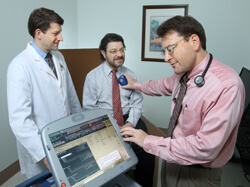
Cardiovascular Report
June 19, 2013

“I was retaining a lot of fluid,” says Olkon. “I was short of breath and very weak.”
Olkon’s long-time cardiac electrophysiologist, Alan Schneider, who practices at Suburban Hospital in the Washington, D.C. suburbs of Maryland, referred Olkon to Johns Hopkins heart rhythm specialistJoseph Marine for consideration of a complex catheter ablation for atrial fibrillation.
“Mark is one of the most complex patients out there,” says Schneider. “His heart was badly out of rhythm. We thought that if we could get his heart back into a normal rhythm with the ablation, he would feel much better.”
However, during testing at Johns Hopkins prior to the ablation, Olkon was found to be anemic and edematous, and his kidneys were not functioning properly. He was admitted to the hospital for more tests and treatment to improve his hemoglobin and heart failure symptoms. While his condition improved, his doctors began to reconsider whether the ablation was the right course of action.
“We thought that there was less than a 50 percent chance that the ablation would be successful and since Mark’s heart was so weak, we knew that the procedure would present greater risk. So after thorough discussion, we made a shared decision that the ablation was not the best course of treatment,” says Marine.
Schneider and Marine then considered another option—to upgrade his device to a biventricular pacemaker/defibrillator to pace his left ventricle, as well. Schneider performed that procedure for Olkon at Suburban Hospital, and it proved to be a good decision.
“With cardiac resynchronization therapy, we were able to improve his forward flow and cardiac output,” says Schneider. “His atrial fibrillation is here to stay, but at least now his bottom chamber is pumping stronger and he is feeling better.”
“While I’m still limited in my activities,” Olkon says, “I no longer feel any chest discomfort or shortness of breath, and so it worked out well.”
Olkon says he is pleased with the coordinated care he received. “My care at Johns Hopkins was very good and the doctors there were in constant touch with Dr. Schneider.”
A Closer Collaboration
In early 2012, Alan Schneider’s cardiology group, Maryland Heart, P.C., a 17-physician group practicing in Montgomery County, Maryland, joined the cardiology practice of Johns Hopkins Community Physicians (JHCP). Maryland Heart, now known as JHCP Heart Care, had been practicing primarily at Suburban Hospital, which has become part of the Johns Hopkins Health System.
“Our goal is to work together to provide the highest quality, coordinated and streamlined care for patients at the right place and the right time,” says Joseph Marine, who serves as the cardiology section chief for Johns Hopkins Community Physicians. “Mr. Olkon’s case is a good example of how our collaboration works to improve the care process and provide the appropriate expertise to help patients with complex sets of problems.”
Cardiologist Harry Bigham, who is the Greater Washington-area regional director for JHCP Heart Care, says the close interaction of his group with Johns Hopkins faculty physicians has facilitated collaboration and communication in handling complicated and unusual patient cases.
“We have immediate access to subspecialists at Hopkins with expertise in areas such as transplant, transcatheter aortic valve replacement and genetic evaluations, not just to refer patients but also to keep up with their care. And then we have all the information we need to follow up with our patients once they return home,” Bigham says.

